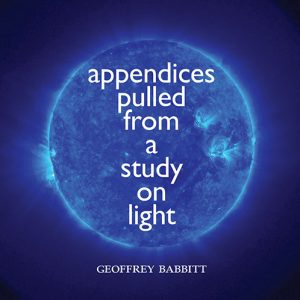Book Review
Geoffrey Babbitt admits to an avid fixation: “I am drawn to illuminated manuscripts.” That was back in 2010 when his essay “In the Gloom, the Gold Gathers the Light Against It” first appeared online in the Collagist. He has since significantly, if ever so slightly, revised the line in Appendices Pulled from a Study on Light: “I don’t know why I am drawn to illuminated manuscripts.” That self-questioning (“I don’t know why”) makes a big difference. It admits a useful openness that allows for discovery to enter into the writing rather than declaring the ground of his subject to be clearly staked out. There is a certain looseness and the implicit promise of exploration—the promise that the writing will work out his fascination through creative engagement.
The poems and prose in Appendices Pulled from a Study on Light thus delve into Babbitt’s passion for illuminated manuscripts, his confessed object of reverence. For ease of reference, Babbitt includes color reproductions of several illuminated manuscript pages from The Book of Hours. This popular Christian devotional from the Middle Ages, found in many households of the time, is composed of texts, prayers, and psalms with accompanying illustrations. As with all medieval manuscripts, the writing and illustrations were executed by hand by monk scribes. Individual contents of each manuscript often vary from one to the other.
Babbitt is attentive to the unique physical nature of the illuminated manuscript. He celebrates evidence of wear and tear from past handling, declaring there’s “a frictional current between the auras of the artist and the manuscript’s original owner. The bottom corner of a leaf, for instance, might have an area of thumb-smoothed vellum, lightly browned by the skin’s oil.” Babbitt continues, noting how “the auras are palpable.” He even provides a visual example of a full-color reproduction of an empty manuscript page, “Backside of Illustration of the Nativity,” where hints of the illustration on the opposite side can be seen bleeding through. The dull, throbbing stains of time now discolor the once-unblemished surface.
There are sidebar commentaries included alongside Babbitt’s prose wherein he remarks on the passage at hand with additional personal detail and/or contributes quoted sources for affirmation. These are some of the most compelling moments of the book. Along with viewing illuminated manuscripts and explorations of dazzling manifestations of light, Babbitt extols the joy of reading with a poet’s enthusiasm. Babbitt demonstrates how the poet at work is constantly turning the act of reading into the act of writing—scraping off a bit of text from here and there to (in)form the poem developing upon the page.
The literal illumination of both text and scribe is a central focus. Babbitt may be an agnostic, as he claims, yet his writing at times approaches visionary mysticism. For example, when he reveals his own experience of a personal vision: “I woke one morning in the grip of an intense, hair-raising, spine-tingling light.” Unfortunately he offers up few further details of the event. His confession that “telling my mother about it the next day broke me into pieces” only leaves the reader wondering, hoping for some further revelation. It is disappointingly anticlimactic and less than convincing.
When staying within the historicism of the manuscripts and scribes themselves, Babbitt’s footing remains most solid. Even as hints of the sensational appear—“Behind the best illuminated manuscripts lies the sense that a scribe or an illuminator might have broken out into light during its making”—these touches are well grounded by outside sources. For instance, poet Gustaf Sobin’s reflections on the darkness of most interior rooms during the medieval era versus the lightness in churches from many candles lead Babbitt to the summation: “‘God is light,’ to the medieval mind, must have seemed a metaphor ever on the cusp of realizing itself.”
Interestingly enough, while Appendices is a miscellaneous selection of written and visual material relating to Babbitt’s explicit preoccupation with religious documents, it does not announce itself as a testament of religious conviction. There is no salvation attested to, no religious awakening celebrated. There is neither spiritual growth nor significant disavowal. However, if there is a religion to be found in evidence here, it is perhaps that of poetry.
No less a celebrated poet than Dante has taken up the trope of our bodies returning to the stars, “the light” from which we originated. Similarly, the Dante scholar Gregory B. Stone remarks how in the closing lines of the Commedia, “Dante represents himself as having become, literally, a star.” This occult poetic lineage may be traced backward to Dante and beyond, from Middle Eastern sources via Spain, to poetic generations from the twentieth century via Ezra Pound. Babbitt doesn’t directly reference this lineage, remaining generally within the context of the Christian church, drawing instead upon religious accounts such as Saint Columba’s miracle: “His fingers shine like long candle flames, yes, and their light fills the church.” At the same time, Babbitt continually praises the work of scribes: “Only the hand that inscribes is sufficient to shine” and “Scribes keep God’s speech acts going.” For after all, “the Word was God” and “God is light.” The point, it would seem, is that the poet is just another scribe like so many countless others, and every poem is yet another job handed down from an unnameable, ultimately, unknowable beyond. Of course the big difference is that poets, especially these days, are always announced and celebrated by name, while those medieval scribes of old are deafeningly anonymous masters of their art.
About the Reviewer
Patrick James Dunagan lives in San Francisco and works at Gleeson Library for the University of San Francisco. His essays and book reviews appear frequently within a wide number of both online and print publications. His recent books include "There Are People Who Think That Painters Shouldn’t Talk”: A Gustonbook (The Post-Apollo Press), Das Gedichtete (Ugly Duckling Presse), from Book of Kings (Bird & Beckett Books), and Drops of Rain / Drops of Wine (Spuyten Duyvil).
